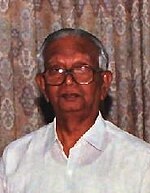- 1 2 "Member's detail" (PDF).
- ↑ "Raghunatha Reddy dead". The Hindu . 5 March 2002. Retrieved 31 December 2018.[ dead link ]
- ↑ India book of the year. Encyclopædia Britannica (India). 2003. p. 17. ISBN 978-81-8131-000-2.
- ↑ "Tripura - Governors". tripura.nic.in. Archived from the original on 9 July 2011. Retrieved 9 July 2011.
- ↑ Bulletin of the Ramakrishna Mission Institute of Culture, Volume 49. Ramakrishna Mission. 1998. p. 247.
- ↑ "Quicktakes". Indian Express . 14 December 1997. Retrieved 27 November 2010.[ dead link ]
- ↑ Trivedi, H. N. (1977). Thirty years of the Indian National Trade Union Congress, 1947 to 1977. Indian National Trade Union Congress. p. 35. OCLC 5971288.
K. V. Raghunatha Reddy | |
|---|---|
 | |
| 6th Governor of Tripura | |
| In office 12 February 1990 –14 August 1993 |